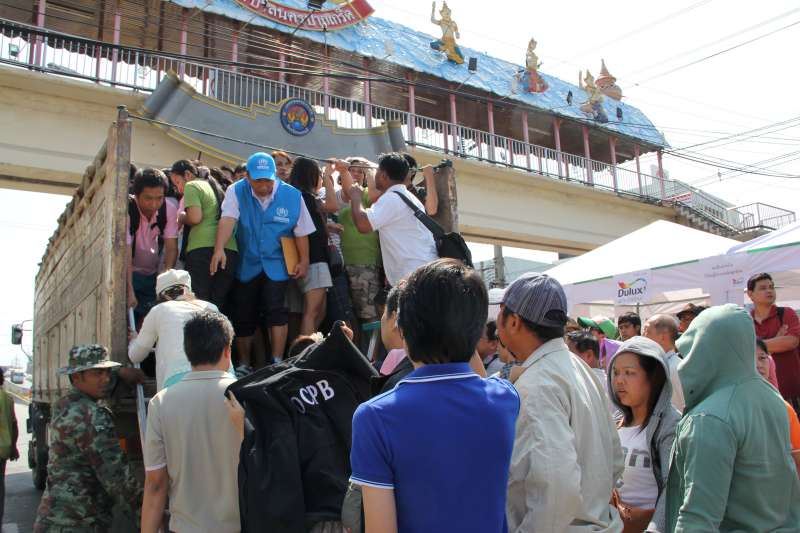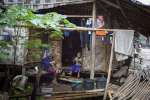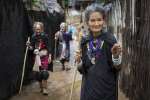Thailand's epic floods no barrier to service
News Stories, 9 November 2011
BANGKOK, Thailand, November 9 (UNHCR) – Thailand's worst floods in more than 50 years have killed more than 500 people and affected nearly 3 million, but the UN refugee agency continues to deliver uninterrupted services to nearly 150,000 refugees and asylum-seekers here.
A quarter of UNHCR's national and international staff based in the Thai capital – 17 staff members out of 68 – have been forced from their homes, and another three are facing evacuation in coming days.
"My job is essential; refugees would not be able to depart for resettlement and get the opportunity for a new life," said Khajeepan Kruawan, who had to be rescued from her own home north of Bangkok more than three weeks ago.
"That's why I have to come to the office," she added. As resettlement assistant, she prepares documents requesting Thai exit permits for departing refugees, a job that cannot be done from home.
The 148,000 refugees from Myanmar – both registered and unregistered – living in nine camps along the Thai-Myanmar border were barely affected by the floods, but the same cannot be said for 2,000 refugees and asylum-seekers from 44 countries living in Bangkok. Many services have been disrupted, and 26 of them have had to leave their homes or move to higher floors in the same buildings. More are still threatened by floodwaters.
Unusually heavy monsoon rains this year have sent torrents of water advancing on the Thai capital, with district after district submerged in recent weeks. UNHCR has donated US$50,000 cash to the Prime Minister's Office Disaster Victims' Assistance Fund, and plans to distribute solar-powered lanterns to Thais displaced by the floods.
Many refugees in Bangkok now have to take boats to the building in a residential neighbourhood where they normally get free medical service, informal education and small food rations. UNHCR has given them cash grants to tide them over.
"We are translating important messages into the refugees' languages to protect them against injuries and vector-borne diseases that are a danger during floods," said Herve Isambert, UNHCR's senior regional HIV/AIDS coordinator.
"We are also trying to make sure that they have the medicine they need for any chronic illnesses such as AIDS, diabetes or tuberculosis – and that they don't forget to take it during this stress."
Isambert, who is a medical doctor, said it will also be important to provide counselling to refugees after the floods to help them recover from the trauma of losing everything – yet again.
UNHCR staff members say being forced from their homes has given them new insight into how the people they serve feel when they are cut off from familiar surroundings, friends and family. "Even though I was well prepared and had supplies and a 4X4 (four-wheel drive vehicle), it's been very difficult," said Chulapat Jirayut, assistant information technology officer. He has had to relocate twice and has sent his 18-month-old son out of Bangkok with his parents.
But he was still thinking of others. "Imagine asylum-seekers and refugees have nothing. They can only carry two bags and sometimes almost no food. But it's more the psychological feelings than the material things," he said.
Chulapat was the staff security warden who got an SOS from Khajeepan, the resettlement assistant, early on October 17, when floodwaters encroached into her modern two-floor home. Khajeepan walks with difficulty after a spinal cord injury suffered in a traffic accident six years ago. She works in a wheelchair and sometimes uses a walker, but she knew she did not stand a chance against rising flood waters: "When I saw the water, I didn't think I could do it."
Chulapat and his senior colleague, Gry Kristiansen, drove to Khajeepan's rescue. "It was really terrifying how fast the water was rising," Kristiansen said. "When we walked to her house, it was up to our knees. When we came back two and a half hours later, it was up nearly to my chest. And the current was incredibly strong."
Khajeepan had no idea other colleagues were concerned for her safety. "They risked their lives in that dirty water, she said, adding: "They made me believe I could do it." Even though Chulapat offered to carry her, she got her crutches and the three started out. Fortunately Kristiansen found a large raft of polystyrene foam and they were able to float Khajeepan out to the parked car.
Now staying in a Bangkok hotel, Khajeepan says, "I am proud of my job. Resettlement is about giving refugees the opportunity for a new life."
By Kitty McKinsey in Bangkok, Thailand













































